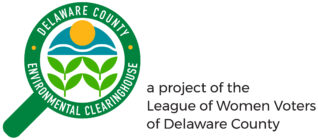DEP Hears Public’s Complaints and Ideas over Marcus Hook Energy Transfer Permit

Concerned citizens filled the folding chairs at the Marcus Hook Community Center Feb. 18 to voice their opinions about air pollution emanating from the Energy Transfer Marketing and Terminals (ETMT) industrial complex there.
Members of the public and staff from the Department of Environmental Protection (DEP) alike congregated in the center dwarfed by ETMT’s adjacent petrochemical tanks and spewing smokestacks.
The purpose of this gathering was to gain public feedback on the renewal of Title V Operating Permit (TVOP) No. 23-00119 for Energy Transfer Marketing & Terminals, LP (ETMT). If approved, the permit would require ETMT to maintain its current level of compliance with government standards for air quality while operating and maintaining equipment the facility.
ETMT processes, stores and distributes natural gas liquids (NGLs) and petroleum products.
This event was hosted by Amani Reid, Eastern Regional Coordinator for DEP’s Office of Environmental Justice. At its hearings, the DEP does not answer questions but takes comments from the public that it later transcribes and considers with other comments when deciding whether to issue new permits. Each speaker was limited to five minutes.
EMTM’s environmental representative Kevin Smith spoke first, highlighting the company’s progress in reducing some specific air quality emissions, transitioning from petroleum products to “cleaner” natural gas, building community connections, and contributing significantly to the economy of the area.
During the nearly two-hour session, three or four other ETMT employees also came to the microphone to underscore the importance of their jobs, homes, and hopes that radiate from these operations.
The bulk of comments, from individuals and environmental groups, were less supportive.
Echo Alfred of the Clean Air Council said that she had spent her life in this area and, as a child, saw these facilities as a “forbidden playground.” As a mother, she now has a child plagued with allergies and even nosebleeds consistent with exposure to benzene.
Dr. Lauren Minsky, an assistant professor of health studies at Haverford College, conveyed the data that she and her students have compiled regarding cancer rates for adults in this area when compared to age-adjusted rates in the entire United States.
Their research shows that residents have 9.6 times the rate of laryngeal cancer, six times the rate of esophageal cancer, more than five times the rates of liver and bile, lung and bronchial cancers, and Hodgkins lymphoma and more than two times the rates of uterine, ovarian and breast cancers.
Faith Zerbe, a member of the staff of the Delaware Riverkeeper Network, underscored the cumulative impacts of the pollution sources in the area that she characterized as a “murder zone.”
Another speaker talked of the risks and hazards of the stored natural gas products including not only natural gas liquids and methane, but also ethane, propane and butane. He said that based on his calculations, an incident trigging an explosion of those products, above or below ground could have an impact ranging from 130 to 260 times that of the bomb dropped at Hiroshima.
He also said that exporting of NGLs increases the price of natural gas for homeowners and contributes to global climate change and its cancer-causing risks.
Dr. Joni Ceasar, a member of Physicians for Social Responsibility of Pennsylvania, shared that the facilities were contributing to worsening health in the community. She said that particulates, volatile organic compounds (VOCs)and other emissions were correlated with increased asthma and premature death.
Dr. Ceasar said ETMT has had 120 violations of compliance standards and has a bad track record for compliance that has turned the area into a “sacrifice zone.” She urged DEP to protect the people and not the industry.
Zuline Mayfield, speaking on behalf of Chester Residents Concerned for Quality Living (CRCQL), characterized the area as an “environmental genocide zone.” She conveyed her support for all life – both that of workers and that of residents who are both impacted by pollutants.
She said that the $355 million dollars in health care costs of Delco residents must be weighed when looking at the economic benefits of polluting industries. Zulene urged DEP to not approve the permit until ETMT does better.
Sister Nora Nash, a sister of Saint Francis of Philadelphia, encouraged those present to consider the need for social responsibility and human rights in an environment raped by corporate greed and marred by a failure to listen to the voices of the people. She stated that exporting LNG is not in the public interest – its health, safety, climate or economy.
Roberta Winters spoke on behalf of the Delaware County League of Women Voters. She stressed the need for requiring compliance standards based on the best available technologies, the cumulative impact studies of emissions from all facilities and improved alarm systems.
There needs to be stronger enforcement and fines for violations, on-going Health and Environmental Risk Assessments (HERA) and consideration of the growing contributions of such emissions to the current climate emergency. She urged DEP to uphold Article 1, Section 27 of the PA Constitution that provides citizens the right to clean air.
Marcus Hook Councilman Michael Manerchia shared local history and his family’s involvement with the industry for more than a century. He assured the audience of the competence of the local and company firemen to deal with an incident. He added that there is an emergency “code red” system in place as well as several evacuation routes, if needed.
Roberta Winters for Delaware County Environmental Clearing House
–

